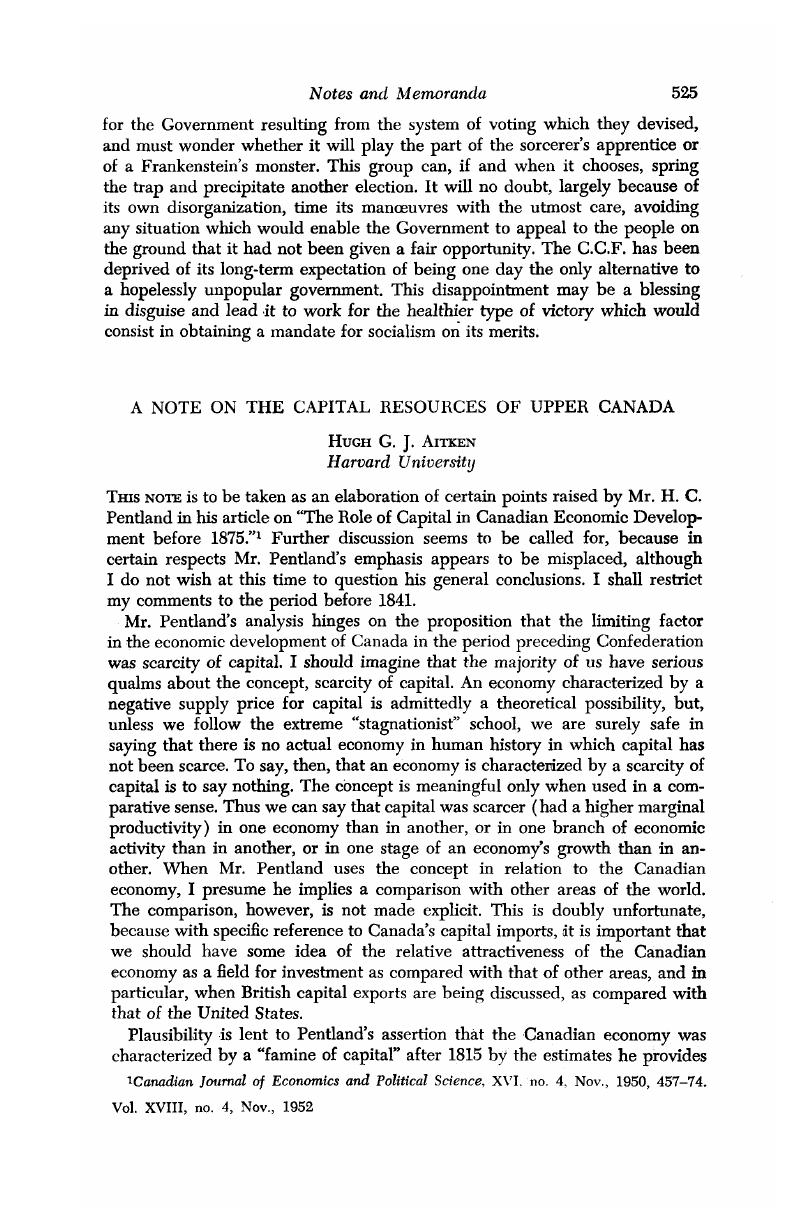Article contents
A Note on the Capital Resources of Upper Canada
Published online by Cambridge University Press: 07 November 2014
Abstract

- Type
- Notes and Memoranda
- Information
- Canadian Journal of Economics and Political Science/Revue canadienne de economiques et science politique , Volume 18 , Issue 4 , November 1952 , pp. 525 - 533
- Copyright
- Copyright © Canadian Political Science Association 1952
References
1 Canadian Journal of Economics and Political Science, XVI, no. 4, 11, 1950, 457–74.Google Scholar
2 Ibid., 464.
3 Cleveland Herald, April 2, 1829.
4 Financial Register of the United States, I, no. 89, cited in Jenks, L. H., The Migration of British Capital to 1875 (New York, London, 1927), 363 n.Google Scholar This estimate applies, strictly speaking, to British immigrants into the United States; probably a lower figure would be more appropriate for Canada.
5 Upper Canada, Assembly, Journals, 1839, Appendix vol. II, 543 ff., SirArthur, George to Lord Glenelg, Toronto, 11 20, 1838.Google Scholar
6 Province of Canada, Assembly, Journals, 1841, Appendix.Google Scholar
7 McGrane, R. C., Foreign Bondholders and American State Debts (New York, 1935), 35, 39.Google Scholar
8 Jenks, , Migration of British Capital, 85 Google Scholar; McGrane, , Foreign Bondholders, 9.Google Scholar See also Trotter, Alexander, Observations on the Finances of the North American States (London, 1839).Google Scholar
9 Jenks, , Migration of British Capital, 66, 73–4, 85.Google Scholar
10 McGrane, , Foreign Bondholders, 7.Google Scholar
11 Note, for example, Dunn's consternation in 1839 when he learned that Barings had sold Upper Canada debentures under par. See Upper Canada, Assembly, Journals, 1839, Appendix, 731–2, Dunn to Macaulay, 02 28, 1839.Google Scholar
12 Ibid., 1831, Appendix, 41.
13 Ibid., 1833-4, Appendix, 116, Baring Brothers to the Receiver General, June 21, 1833.
14 Ibid., 1837-8, Appendix, Third Report of Committee on Finance, Baring Brothers to J. H. Dunn, July 15, 1837.
15 Duesenberry, James S., “Some Aspects of the Theory of Economic Development,” Explorations in Entrepreneurial History, III, no. 2, 12, 1950, 63–102.Google Scholar
16 Great Britain, House of Commons, Report from the Select Committee on the Civil Government of Canada (reprinted Quebec, 1829), 255–6Google Scholar, evidence of W. H. Merritt.
17 Ibid., 99, evidence of Simon McGillivray.
18 Jenks, , Migration of British Capital, 80–1.Google Scholar
19 Langton, W. A., ed., Early Days in Upper Canada: Letters of John Langton from the Backwoods of Canada and the Audit Office of the Province of Canada (Toronto, 1926), 119.Google Scholar
20 SirWatkin, E. W., Canada and the States (New York and London, 1887), 358.Google Scholar
21 British American Journal, April 15, 1834.
22 Jenks, , Migration of British Capital, 69–70 Google Scholar; McGrane, , Foreign Bondholders, 11–12.Google Scholar
23 British American Journal, Jan. 28, 1834.
24 Ibid., April 15, 1834.
25 Public Archives of Canada, Merritt Papers, vol. 3, J. H. Dunn to W. H. Merritt, Oct. 20, 1835.
26 Ibid., W. Allan to W. H. Merritt, Nov. 5, 1835.
27 There was probably more than a grain of truth in the assertions of the Select Committee on Trade and Commerce which reported in 1835: “Our commercial prosperity is retarded, and emigrants of wealth, talent, and enterprise induced to avoid our shores, by the knowledge they have, that men in whom the public would have confidence, cannot and will not be placed in those situations of power and trust, where they might check misrule and punish the authors of it. Unless the Legislature is enabled to assume control of the whole public revenue, from whatever source derived, and unless the nature of the Government is such, that all public officers can be made accountable, on this side of the Atlantic, for their official conduct, those principles of economy and retrenchment, on the operation of which the whole fabric of domestic prosperity and successful competition in foreign commerce would safely rest, cannot possibly prevail.” (Upper Canada, Assembly, Journals, 1835, Appendix, First Report of Select Committee on Trade and Commerce.) As I have stressed elsewhere, I believe the absence of a mercantile or business-oriented official class in Upper Canada to be very significant.
- 1
- Cited by




